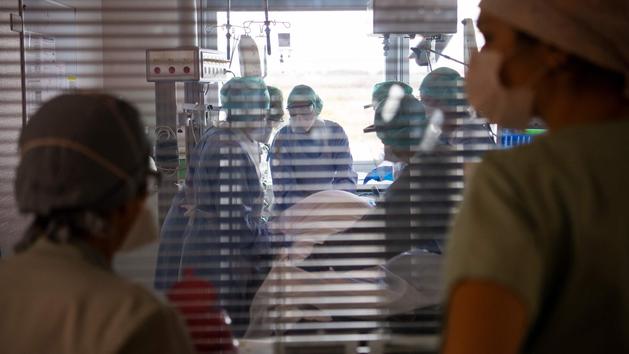Last April, Daniel kept swearing.
"Because of these fools who do not respect confinement, I'm going to go there!"
, repeated, half-laughing, half-indignant, this man of 76 years strong in mouth.
He suffered from serious heart problems and was awaiting double bypass surgery.
Vital operation therefore, initially scheduled for early April and postponed a month later in the face of the influx of coronavirus patients in hospitals.
His condition deteriorated and Daniel eventually died shortly after the operation.
Today, his son Franck is wondering.
"Would he have survived if he could have had emergency surgery, as planned?"
He doubts.
“We'll never know, but his chances have diminished.
He did not die from the coronavirus, but probably because of it.
"
Daniel Molmy is one of these collateral victims of the first wave of coronavirus, which doctors estimate to be hundreds of people.
But the Minister of Health Olivier Véran intends this time to avoid the pitfalls of spring.
"The surgeries for cancer, the transplant activity, the management of chronic diseases [...] must be able to continue",
he repeated Thursday, November 5 during his weekly press conference.
However, with 4,421 people in intensive care on Thursday, occupancy rates in these services exceed 100% in some regions, forcing hospitals to deprogram operations to free beds.
These are set locally by the regional health agencies (ARS), with deprogramming thresholds that reach 30% to 50% depending on the case, according to the Fondation des Hôpitaux de France.
Sometimes more, as the epidemic continues to grow.
At the mutual clinic of Saint-Etienne, in the heart of the cyclone of the second wave,
"the 15 operating rooms were reduced to 5 per day"
, recognizes Jean-Luc Gay, vascular surgeon.
The difficult definition of emergency
“
Non-essential
”
surgeries are therefore sacrificed
, like the one that awaited Sandrine on November 5, from Etampes (Essonne), in order to remove kidney stones.
A non-fatal condition, but infinitely painful.
She had gone to the SAMU three times in October
"on the verge of fainting"
.
His intervention was canceled three days before the scheduled date.
"
In the meantime, it will be a double dose of doliprane,"
sighs Sandrine.
What if a crisis happens again?
"Come back to the emergency room,"
advises the hospital secretary over the phone.
I have 8 out of 10 "chances" of developing cancer
Caroline Gilles, awaiting a masectomy
Difficult, precisely, to establish this border of urgency.
Recovery is often a race against time: for example, a one month delay in treating cancer increases the risk of death by 6 to 13%, according to a British study published by the medical journal BMJ.
After breast cancer, a mastectomy and one year of chemotherapy in 2019, Caroline Gilles is no longer considered a "
sick
" person.
The preventive removal of her left breast, scheduled for October, has therefore been postponed to an indefinite date.
However, this 39-year-old girl from Lyon suffers from the BRCA genetic mutation which predisposes her to the disease:
“I have 8 out of 10 'chances' of developing cancer,” she
explains.
Her first tumor developed in less than three months.
“When I look at myself in the mirror, I feel like I'm living with a time bomb under my breast,”
she says.
Read also: Cancer: delaying treatment, even by a month, increases the risk of death
"There are no serious ailments on one side, and on the other benign
"
Postponing a surgical operation can compromise the chances of its success and lead to complications.
"Time is an aggravating factor",
warns Magali Léo, a manager of the Renaloo association which supports patients with kidney failure.
In several establishments in Lyon, Marseille or Saint-Etienne, kidney transplants taken from living patients have been postponed.
"By waiting too long for the transplant, patients risk being placed on dialysis, which increases their exposure to the coronavirus, and increases the risk of complications during the operation"
, she regrets.
“There are no serious illnesses on the one hand, and benign illnesses on the other. It all depends on the care ”,
summarizes Xavier Pothet, general practitioner in Vanves (92).
He thinks in particular of a relatively elderly patient, whom osteoarthritis, for lack of an operation, risks paralyzing:
“Her operation was canceled.
She may end up in a wheelchair and will never walk again, ”he
sighs.
Polytrauma after a bad ski fall last winter, Isabelle Maurandi had to undergo knee surgery in April in a private clinic in Lyon, finally postponed to February 2021. Since then, this 50-year-old teacher has been walking with a cane and has developed a Acute low back pain: serious back problems, which lead to sick leave and heavy drug treatment.
“My recovery had to be quick.
Ultimately, the consequences of the accident will last for years, ”she
sighs.
A sort of patients who do not say their name
So when a patient asks Jean-Luc Gay, the surgeon in Saint-Etienne, what he risks while waiting for his operation, the caregiver admits his uncertainty.
“If we operate, there is a reason.
But we have to make choices.
Between a patient who suffers from a 50mm aneurysm, and another of 55mm, I first operate the second, even if both are in danger ”
, concedes the surgeon.
Read also: Coronavirus: caregivers alert on the ethical issues of deprogramming
The much feared
“triage of patients”
intervenes in multiple and complex facets, depending on the rational and ethical choices that healthcare professionals must face.
"Hospitals deprogram operations so as not to have to 'choose between patients' ... But this necessarily implies a choice upstream"
objects Céline Lis-Raoux, president of Rose-up, which supports patients suffering from breast cancer .
The association has set up a platform to identify patients whose medical monitoring has been deprogrammed to alert the ARS.
"We must draw conclusions from the errors of the first wave, the invisible victims that we could not anticipate
.
"
The National Ethics Committee must deliver a much awaited opinion on the subject.

